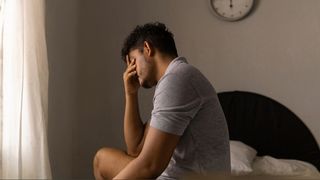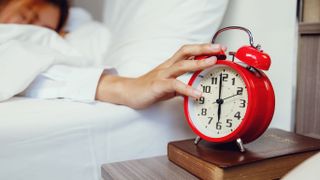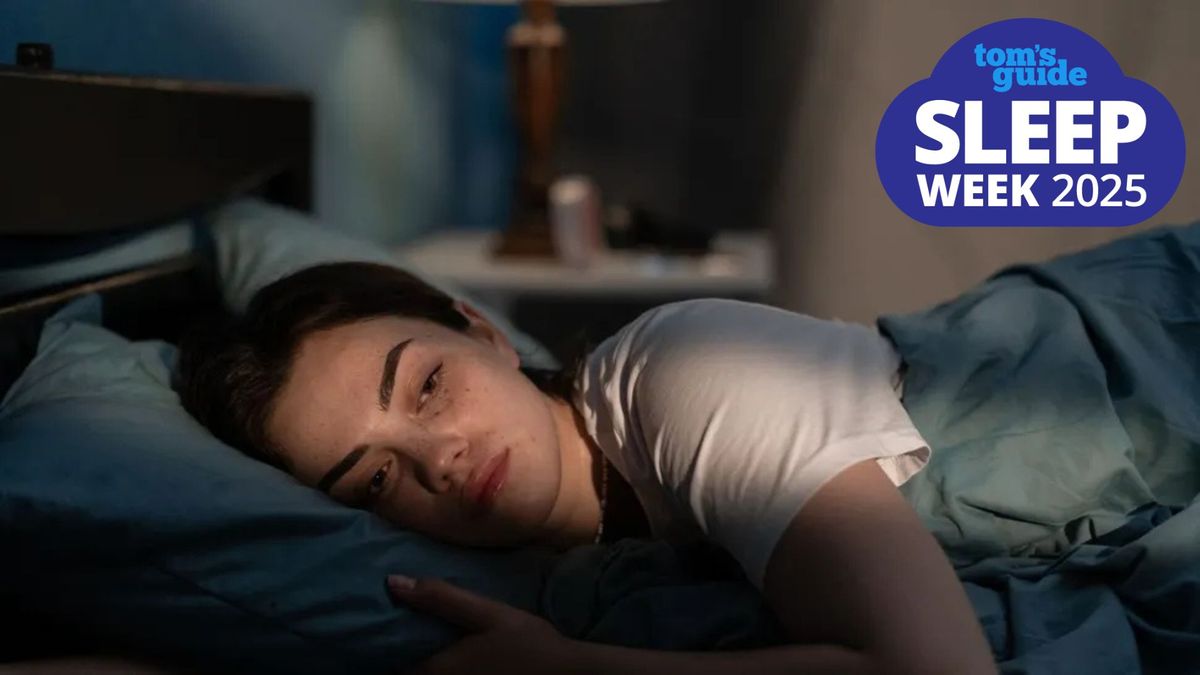Many of us experience a rough night’s sleep from time to time, in fact research shows about a third of us report not getting enough sleep.
But how can you tell if you’re just suffering a temporary bout of sleeplessness or are experiencing actual sleep deprivation? And if you are sleep deprived, how can it affect you?
According to Heather Darwall-Smith, a psychotherapist who specialises in sleep and author of How to Be Awake, establishing whether you’re sleep deprived isn’t an exact science.
“Even after a couple of days of poor sleep technically you can be sleep deprived,” Heather explains, “But generally, this term applies to people who regularly sleep less than 4-5 hours a night a couple of nights a week or more.”
For Sleep Awareness Week 2025, we’re discovering the common causes of sleep deprivation, how to identify when your sleep patterns are becoming a problem, and how to solve them.
What is sleep deprivation?
Experts generally recommend adults get at least seven hours of sleep a night to function optimally. Yet research shows around 20 percent of us get far less than this on a regular basis.
Sleep deprivation is when someone is getting less sleep than their body requires on a regular basis – this can also be known as sleep insufficiency.
“If you often have two or more nights a week where you a sleeping less than four or five hours, you are probably sleep deprived,” agrees Heather.
What causes sleep deprivation?
Many factors can contribute to sleep deprivation. “Some can be more easily mitigated and are down to physical sleep disruptors, like jet lag for instance, when recovery is naturally likely to come,” explains Heather.
“Other, more long-term disruptors can be harder to pinpoint and resolve, but it is possible to overcome sleep deprivation and improve your sleep health.”
In my experience, the rise of longer working hours have a lot to answer for
“In my experience, the rise of longer working hours have a lot to answer for, we’re likely to be more stressed and anxious, or work later, which can prevent regular, quality sleep patterns,” explains Heather.
But major lifestyle changes outside of our control can also be a factor too.
“Parents with babies or young children often experience periods of sleep deprivation,” she says, “periods of illness or grief can also disrupt sleep.”

Diet and lifestyle can play a big part too. “Alcohol has a big impact on sleep deprivation” Heather explains.
“Social jet lag, where people struggle to sleep properly for a couple of days after a weekend when they’ve been consuming alcohol can have a big impact, as can taking drugs or even consuming excess caffeine,” she adds.
Social media and sleepmaxxing trends may be to blame, too. “Unrealistic routines – think being part of the ‘5am club’ can actually cause major sleep disruption,’ says Heather.
“If you are regularly getting up at 5am to cram more into your day, you’re likely to be sleep deprived as a result.”
Common symptoms of sleep deprivation
Feeling exhausted and being lethargic all day aside, the following sleep deprivation symptoms are also common.
1. Mood changes and irritability
“Studies show people see the people around them differently when they are sleep-deprived, they find it harder to read people’s faces, and as a result, treat them differently,” explains Heather.
“They may feel a lack of empathy towards others and be reactive or irritable, which can cause conflict during the day, at work, at home, and everywhere in between.”
And this has been proven through multiple studies. So if you feel like you have a shorter fuse after a bad night’s sleep, or snap at someone unintentionally, this could be why.
2. Memory issues
Problems recalling information or remembering things are key markers of sleep deprivation.
“Being sleep deprived means the part of our brains that process memories and enable us to store and retrieve information simply don’t perform as well,” says Heather.
This can mean we struggle to retain information too, triggering frustration and self-doubt. Some research shows that our memories and emotions are actually processed during the REM sleep stage, so having a disrupted sleep cycle can affect how we cope with regulating our emotions.
3. Anxiety and depression

Sleep impacts anxiety and depression differently. Some studies show that medical professionals and shift workers who experience sleep deprivation as a result of their working patterns may experience depressive symptoms too.
“Poor sleep quality makes mental health worse and vice-versa,” explains Heather, “Sleep deprivation can disrupt key hormones like cortisol, serotonin and dopamine, which, if longer-term sleep deprivation becomes an issue, can lead to feelings of sadness and hopelessness.”
4. Microsleeping or napping during the day
Microsleeping can be dangerous – simply put, if you’re so sleep deprived that you fall asleep behind the wheel of a car for example, even for a couple of seconds, you could have a car crash.
What is microsleeping?
A microsleep is when we fall asleep for the briefest of moments, so brief in fact, that we might not realise it has happened. Microsleeping can even happen with our eyes open.
“Scheduled napping however can be a useful tool if you need to top-up on lost sleep,” explains Heather.
“But it can be an issue if you sleep too long during the day because adenosine, which works at a cellular level in our bodies to regulate our sleep-wake cycle, can be used up during day naps, affecting how ready for sleep we feel again at night.”
It’s best to keep naps to around one full sleep cycle or under, so generally, you want to sleep for less than 1 hour and a half. If you’re regularly sleeping for hours during the day, it’s a clear sign of sleep deprivation.
5. Falling asleep in under 10 minutes
Whilst dropping off quickly might seem ideal if you’re short on sleep, falling asleep too quickly can actually be an indicator that the sleep you’re getting isn’t quality sleep or that you may have an underlying sleep disorder.
Ideally, it should take you between ten to twenty minutes to fall asleep
“Ideally, it should take you between ten to twenty minutes to fall asleep,” says Heather. “So if you’re straight out like a light, it can actually be an indicator of sleep apnea, a sleep disorder which means breathing can stop and start during sleep.”
“This means your sleep can become fragmented and you’re more prone to bouts of waking,” she adds.
If you think you may be experiencing sleep apnea, it’s a potentially dangerous condition so it’s important to seek medical advice
How to tackle sleep deprivation
There are many ways to ease the symptoms of sleep deprivation. Here are three easy changes to make that can improve the rest you get.
Stick to a consistent sleep schedule

Making an effort to stick to and maintain a consistent sleep schedule can help regulate your circadian rhythm, making it easier to fall asleep and stay asleep throughout the night, as well as regulating energy through the day.
“Start by focusing on waking up at the same time each day and keep it consistent to within an hour of this time every morning,” advises Heather.
“This will help the adenosine in your cells work with your circadian rhythm to help you produce enough melatonin during the day to sleep well at night.”
Get outside during the day
“Getting outside first thing in the morning is so important in helping regulate our sleep cycles,” says Heather, “Sleep is regulated by daylight, so getting enough exposure is key.”
Daylight helps regulate cortisol and melatonin production which in turn help regulate our body clock.
Alongside this, it can also help you feel more awake to combat the symptoms of sleep deprivation.
“If you struggle to get outside first thing in the morning – perhaps in winter you commute to work in the dark for instance – a daylight lamp or sunlight alarm clock may help,” suggests Heather.

Use naps wisely
If you feel like you need a nap during the day to top-up on lost sleep, make a plan first.
“Ideally, a daytime nap should be no longer than one sleep cycle – around 90 minutes for most of us,” says Heather.
“This means that you should, in theory, feel sufficiently recovered and refreshed on waking, but it shouldn’t prevent you feeling sleepy again at bedtime.
Napping for a full sleep cycle should also mean you don’t feel groggy or worse on waking, so you can continue with your day.”
Tom’s Guide created this content as part of a paid partnership with Helix Sleep. The contents of this article are independent and solely reflect the editorial opinion of Tom’s Guide.









